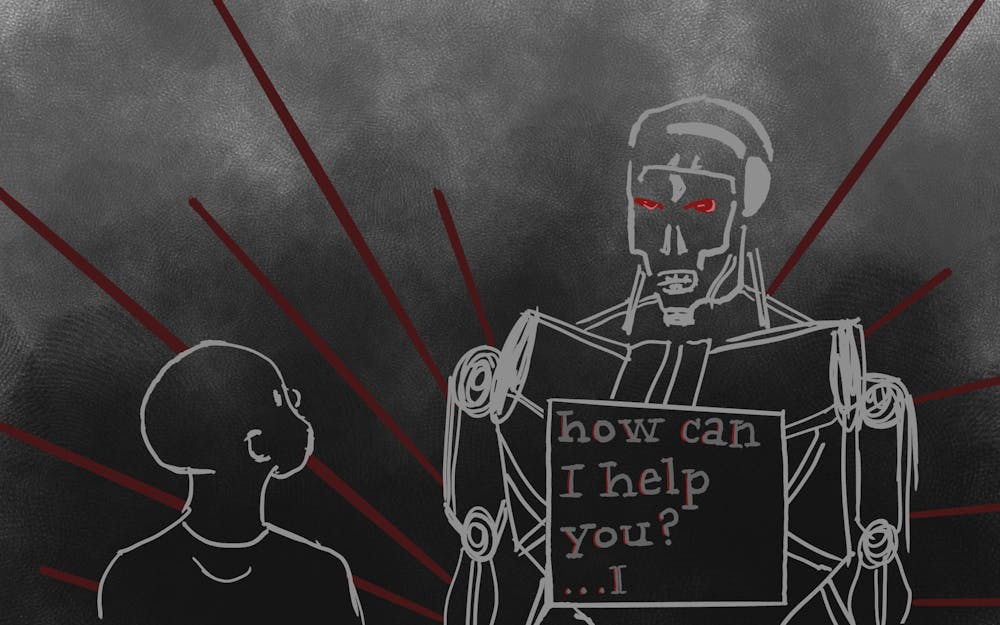It’s in our schools, our hospitals, our cars. It’s been able to replicate our artistic abilities, knows how we think, maybe even knows how we feel. It’s in our phones, on our desktop computer.
When I decided to watch “Terminator” on a Saturday night I was surprised to see the portrayal of “Los Angeles, 2029 A.D” as the opening scene. However, this wasn’t Sunset Boulevard, California with palm trees swaying and blue skies with white fluffy clouds. No, instead it was metal, smoke, machines everywhere, and the human population shrinking.
It made me wonder, how close are we really to living in this supposedly futuristic fictional world?
“Artificial Intelligence” is continuing to infiltrate into our everyday grind of being human. Your car can drive itself with a little voice that has a name that you can give it. Your Instagram feed is perfected to give you videos AI knows you’d want to see. There’s even usage of AI technology for making wifi routers into cameras, through which AI can see through the walls of your home. Researchers say that allowing this kind of usage would make it easier to surveillance elderly people who live at home alone, or to have a built in security system. These devices haven’t hit the marketplace but are being developed to do so. However, the entirety of what these devices would be used for is unknown.
AI scientists have officially built a system of machinery and signals that are built to give and do almost anything we ask of it. It’s strange how there’s this intense presence of a kind of machinery, in my generation, that has been invented for one purpose: to say what we want it to say, and do what we want it to do.
The question is: for better, or for worse?
ChatGPT, for example, has been a hot topic in classrooms this past week. Many of my peers have talked about using it. My friend once showed off an essay that was well articulated, and eloquent with its facts. Then, he proceeded to tell me it was none of his writing. I wonder at AI’s ability so far to dismantle jobs within the journalism world, and to also shove itself into medical advances, taking away the risk of human error. Two sides, all on one coin.
[Related: GUEST COLUMN: The erosion of teacher autonomy in the age of AI-driven tech]
One thing I heard from one of my professors that stuck with me, while lecturing about the unnecessary use of ChatGPT, was: “It takes away your voice.”
This is something AI can't have: the freedom in expressing human opinions and thoughts. Human experiences, the emotions of it all. If AI researchers eventually find a way to replicate human emotion, it would only be a replica. To recreate the human experience into something that is not human seems useless, maybe even futile. It would be better to not try and “recreate” it, rather, to find a way to better live it.
Terminator, for instance. He’s scary, he’s emotionless, he’s powerful. In the movie, Kyle explains to Sarah how the world got taken over by machines: “New, powerful, hooked into everything, trusted to run it all. They say it got smart. A new order of intelligence.”
It seems 2023 Bloomington, IN, isn’t too different from 2029 Los Angeles. With AI seeping into our intrinsic ability to live, we have forgotten how to live as a human without it in the first place. We make mistakes, we make grammatical errors, we cry when overwhelmed and giggle when happy.
AI has shown us a world where what makes humans “weak” — like needing a break or catching feelings for someone who doesn’t feel the same — is something that should be erased. But that takes away a fundamental part of what “living” is. It takes away what, in the end, helps us grow: adversity.
As researchers continue developing and releasing these advanced forms of technology, people are further separated from how they think without the assistance of phones, computers or other technological aides.
To what extent will we keep letting this system run our lives? If we have an automated, tell-us-anything-we-want people-pleaser machine, how are we to learn how to be ourselves? If we are to rely on a robot that has the ability to umbrella all human activity, we as a society risk losing our individuality.
[Related: OPINION: AI could be detrimental to human relationships]
We can already see it happening with TikTok trends and Instagram feeds that group people into other groups that agree with each other. As this happens, all discussions between groups of uncompromising people turn into debates. Not to strive for human connection, but rather to impose one belief onto another. Opinions, like this one, are seen as attacks on personal lives. But here are simply my own observations, up for whoever would like to discuss them.
At the end of “The Terminator,” the only thing that can kill the robot is Sarah pushing on another machine's button, the compressor. Kyle and Sarah had blown it up, even shot at it, but it couldn’t be destroyed by human hands, but rather human invention. I wonder if that’s how these inventions nowadays will have to come to their end, if they do.
I suppose we have six years to see.
Carolyn Marshall is a junior majoring in English and media studies with a concentration in film, TV, and digital production.






